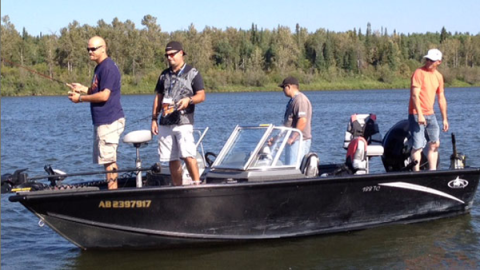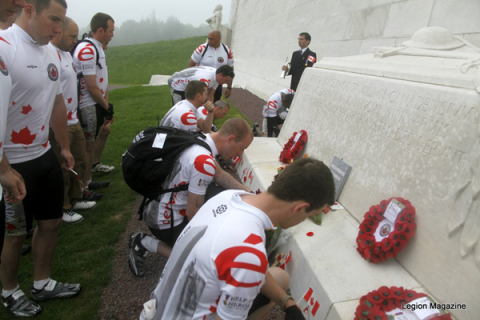
Capt. Johnston traced the origins of Wounded Warriors for Samaritanmag to one specific date, Sept. 18, 2006.
"There was a young fellow I had recruited, Sapper Mike McTeague, and he was struck by an IED [improvised explosive device] that killed four Canadians, a bicycle suicide bomber, and injured 16,” Johnson recounts. “Fast forward a day later, I'm in Lanstruhl Germany, the regional medical centre, visiting Michael. By all accounts, he should have been dead. He had ball-bearings in him everywhere.”
It was McTeague's father, Sean, who requested that Capt. Johnston accompany the family to the soldier's bedside and the military assigned him to be the “assisting officer" to help the family through the tough times ahead. While visiting Mike, he noticed the injured at the centre had very little to help them pass the time, such as electronics and entertainment.
“I saw our injured troops there and I figured we can do better for them. After a couple of phone calls, we'd raised $7,500,” Capt. Johnson says.
The fund, initially called The Sapper Mike McTeague Wounded Warrior Fund, was born. Wounded Warriors supports all Canadian Forces members wounded on operations, at the outset of their healing process. The fund aims to improve the general morale and welfare of the soldiers and their families by working through first-line caregivers, medical staff, chaplains and assisting officers.
From modest beginnings, the fund has grown well beyond any expectations Capt. Johnson initially held, and he estimates that it has raised $2.2 million to date. "Our grassroots are normal folks and $20 bills as donations. We also have big supporters like Bruce Power and Canadian Auto Workers."
The emphasis of Wounded Warrior's work has shifted somewhat in recent years. "We have grown from initially focusing on the physically injured," says Capt. Johnston. "In 2010, we made a decision to focus on those with mental injuries, what I call the unseen wounds." Sixty per cent of the organization's resources are now allocated to pursuing mental health initiatives, especially for reservists, 30 percent to physical health support, and 10 percent to the development of life skills.
A cornerstone Wounded Warriors program is entitled "All The Way Home," and it is centred on veterans suffering from OSI (Operational Stress Injuries).
"The goal of the program is to empower members suffering from OSI and related conditions to return home in a holistic manner, psychologically and spiritually,” it says on the WoundedWarriors.ca site. “Working in conjunction with those who provide care to Canadian Forces Members, the program will seek to encourage members to avail themselves of the programs and services that are in place while providing a healthy environment to assist in their recovery."
Capt. Johnston knows firsthand the challenges facing physically and mentally wounded veterans. From 2006, he worked as Casualty Administration Officer with the Canadian Forces. In 2008, he became National Repatriation Officer for the Fallen, a role whose duties included receiving the body of every Canadian soldier in Afghanistan upon arrival at CFB Trenton.
Capt. Johnston recently left that position after being diagnosed with a severe mission related Operational Stress Injury due to those duties. Currently Capt. Johnston commands HQ Squadron of the Ontario Regiment (Royal Canadian Armoured Corps) located in Oshawa, Ontario. "I suffer from PTSD [Post-Traumatic Stress Disorder] myself, and dealing with mental health is the hardest thing I've ever done,” he tells Samaritanmag.
His situation has made him realize the need for greater awareness within the military and the public of the mental health injuries affecting veterans. "Here in Canada and elsewhere, we lionize the physically injured. We call them heroes, and they are,” says Capt. Johnson. “But I say we have those with their flesh torn from them and those with their souls torn from them, and sometimes both. People are uncomfortable dealing with those with mental injuries. It is talked about in hushed tones.
"Once you have a mental health injury, there is a ripple effect, with physical and social ailments.”
In Capt. Johnson’s unit, part of the Ontario Regiment, he says "My commanding officer has been hugely pro-active on mental health. We talk about it all the time, on all levels. We are a unit of 140, and close to 60 of us have been overseas. Right now, about 14 guys are going to mental health, including myself.
“A senior officer commented that we were above average. My comment was 'Maybe we are the average. We don't stick our heads in the sand.’ We are encouraging guys to say if they are NQR — not quite right — in your soul, then go to the mental health unit. That has made our unit healthier, but sadly as a unit we are very much in the minority in our approach."

"A lot of friends and relationships were made," Capt. Johnston says. "One soldier said to me, 'I realized I was a person again from that ride. I am somebody of worth.' At Wounded Warriors, we are big on taking veterans and putting them in a better place to get better. It's amazing the holistic healing properties when you take soldiers, sailors and airmen away out of their comfort zone."
Another Wounded Warriors-backed event considered a huge success was held this past August 24-26, in Nipawin, Saskatchewan. One-hundred-and-twelve injured ex-soldiers from Canada and the U.S. arrived for a Wounded Warriors weekend, featuring fishing, golfing, musical entertainment, a CFL game, and a banquet. The weekend was the brainchild of country singers Blake Emmons (himself a veteran) and Jim Chute.
"We mixed everyone up, so they didn't just fish with their buddies,” says Capt. Johnson. “We wanted to reinstall their social skills. Once they become comfortable with other and new people, things start to happen magically. Some of the soldiers there told me 'I never got welcomed home until now.' Again, the lion's share of those attending were those who have had their souls torn from them."
Such events will figure strongly in Wounded Warriors future plans. As their site reports, "We envision retreats across the country that will empower veterans and remove the stigma that still lingers around OSI's while giving them an accurate picture of the suite of services and support available to them, in a relaxed social environment."
Wounded Warriors often form strategic partnerships with other organizations to deliver effective programs. "We have partnered with Veteran's Affairs on outreach funding for veterans in Montreal, Vancouver, and Toronto," says Capt. Johnston.
One Wounded Warriors fundraising event that scored plenty of media attention recently took place in Toronto on Oct. 19. A rare bottle of 55-year-old Scotch, Canada's lone bottle of Glenfiddich Janet Sheed Roberts Reserve, was auctioned off, selling for $52,000 that went to the organization. The cheque was handed over to Capt. Johnston at a ceremony hosted by the 48th Highlanders of Canada at the Moss Park Armoury in Toronto on Nov. 8, just prior to Remembrance Day.
Capt. Johnston praised the makers of Glenfiddich (and donors of the bottle), the William Grant & Sons distillery, for "their incredible corporate responsibility. They're the last of the family-owned distilleries, so I see this as family helping family."
In terms of ways the public can help wounded veterans, Capt. Johnston has one piece of advice. "If you know a soldier who is struggling, just talk to them. Treat them normally. Ask how they're doing in a way that is not just going through the motions."
Sounds like the least we can do for these wounded warriors.
nike air dolce black sneakers girls size